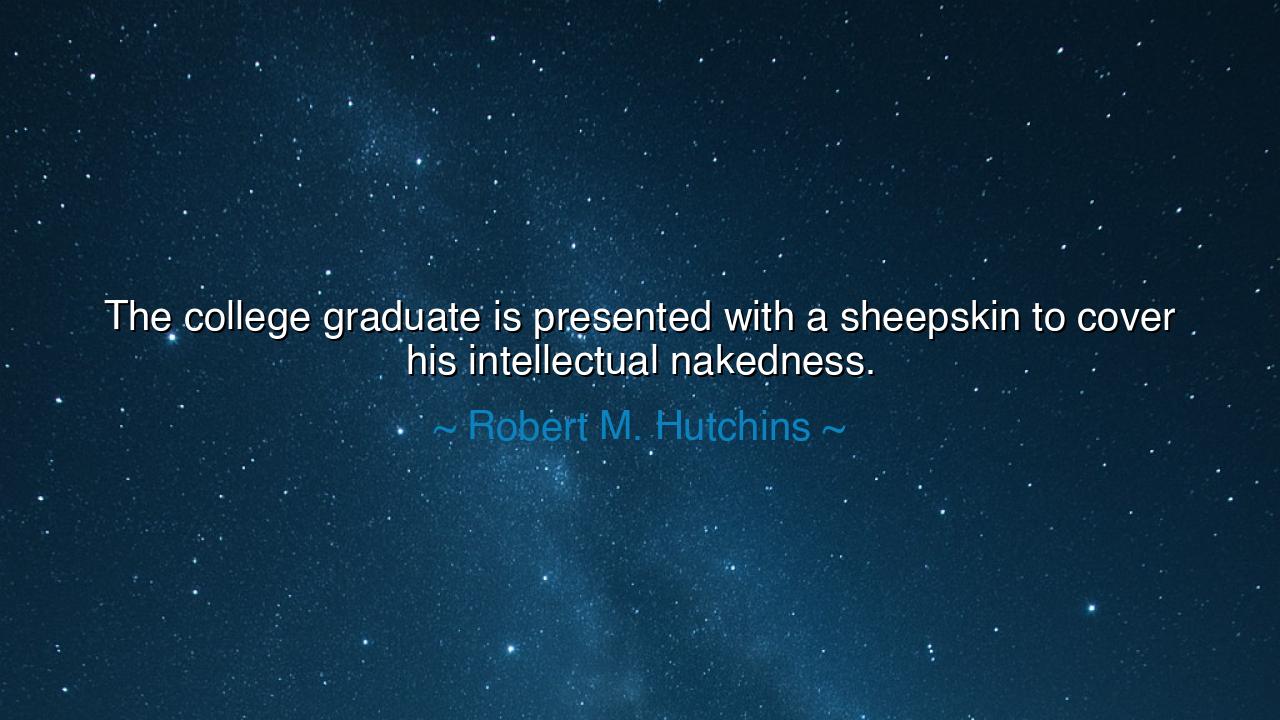
The college graduate is presented with a sheepskin to cover his
The college graduate is presented with a sheepskin to cover his intellectual nakedness.






Listen, children of inquiry, and heed the words of Robert M. Hutchins, who spoke with piercing clarity: "The college graduate is presented with a sheepskin to cover his intellectual nakedness." In this stark declaration lies the ancient tension between appearance and substance, between the honor bestowed by ceremony and the depth of true understanding. The sheepskin, that parchment of graduation, is a symbol of achievement, yet it is but a garment—a thin covering that may hide the gaps in wisdom, the untested intellect, and the untamed curiosity yet to be cultivated.
Hutchins’ words originate from a profound skepticism of ritualized learning that values form over essence. The universities, like grand temples of knowledge, often parade their graduates with pomp and pageantry, proclaiming accomplishment through the bestowal of diplomas. Yet the true measure of a mind is not in the scroll it holds, but in the depth of reflection, courage to question, and ability to reason. To wear the sheepskin is to step into the world with recognition—but not necessarily with mastery.
This observation echoes through the corridors of history. Consider the scholars of ancient Athens, who debated under olive trees and starlit skies. They prized the cultivation of thought over ceremonial accolades, knowing that wisdom is earned through dialogue, reflection, and living inquiry. A student might be honored publicly, yet remain intellectually unarmed, like a warrior given a sword he has never learned to wield. Hutchins’ words caution us against complacency, against mistaking symbols for substance.
The truth is timeless: diplomas and titles are markers, not guarantees. They are tools, not treasures. History reminds us of the tragic figure of Napoleon Bonaparte’s early academy years, where young men were evaluated by rank and rank alone, yet only those who embraced learning with vigor emerged as true strategists. The sheepskin may cover nakedness temporarily, but only the cultivation of intellect and judgment builds enduring strength.
Hutchins’ critique is not an attack on education itself, but a call to vigilance and self-awareness. The college graduate, having walked the hallowed halls, must recognize that ceremonial honor cannot substitute for curiosity, rigor, and moral discernment. Intellectual nakedness is exposed not by failure alone, but by the unwillingness to continue questioning, learning, and confronting uncertainty. The diploma is a beginning, not a culmination—a spark, not a fire.
Consider the modern age, where countless graduates enter the world armed with degrees yet untested by experience, inquiry, or adversity. Like an apprentice swordsman given a polished blade, the potential is there, but the skill must be honed. Hutchins’ warning resonates: do not rest beneath the laurels; the true work of thought, reflection, and action lies ahead. The sheepskin is a cloak, but wisdom must be worn in the mind, not merely displayed in the hand.
The lesson for all seekers of truth is luminous: titles do not equal understanding, and recognition does not equal mastery. One must look beyond ceremonies and symbols, cultivating the mind through persistent questioning, deep study, and engagement with the world. Intellectual courage, humility, and discipline are the garments that truly cover one’s nakedness.
Practical actions arise from this insight: approach every achievement as a beginning, not an endpoint; challenge your assumptions daily; engage in debates, reflection, and self-education; seek mentors who inspire critical thought; and, above all, do not mistake recognition for knowledge. Let the sheepskin remind you not of completeness, but of the journey that stretches infinitely beyond it, calling you to clothe your mind with wisdom that endures across lifetimes.






AAdministratorAdministrator
Welcome, honored guests. Please leave a comment, we will respond soon